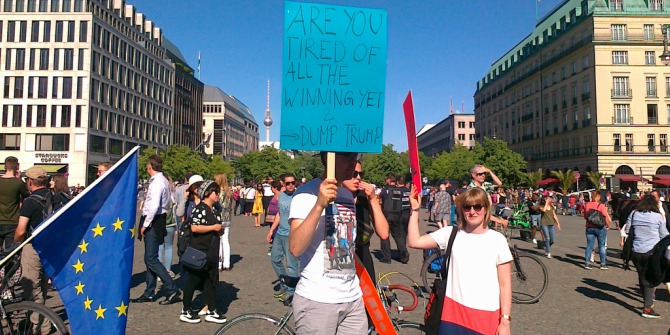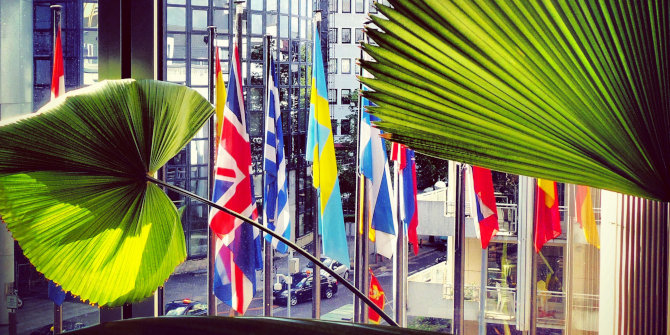When debates become polarised, it can be tempting to treat political opponents as obstacles rather than fellow citizens. Yet as Robert B. Talisse explains, this refusal to engage with the other side not only carries negative implications for democracy, but also produces ineffective, conformist coalitions that are incapable of realising their political aims. If citizens want to achieve their goals in a democracy, they must find a way to work with their opponents.
Democracy isn’t easy. For it to thrive, a lot needs to go right. Citizens must be informed and active. Lawmakers must seek the common good. Institutions must be accessible. Policies must be fair. News outlets must be reliable. That’s a tall order.
These difficulties are compounded because the task of addressing political dysfunction ultimately falls to the people. If officials are corrupt, citizens must vote them out. If policies are outdated, citizens must revise them. If news outlets are skewed, they must be corrected. Even when democracy’s failures owe to institutional defects, the buck stops with the people.
So when we think of challenges facing democracy, we focus on how people fall short of what citizenship requires. We point to an ignorant, narrow-minded, and complacent electorate as the explanation for whatever goes wrong. We hold that democracy’s troubles are due to a democratic deficit among the citizens.
The underlying assumption is that when citizens fulfil their civic duties, democracy is smooth sailing. Alas, this assumption is incorrect. Even when citizens act as they should, democracy occasions serious difficulties.
This is because there’s a moral conflict at the heart of democratic citizenship. On the one hand, citizens are responsible for their political order. They must participate in self-government and strive for justice. On the other, citizens are responsible to one another. They are one another’s equals, and so need to interact in ways that respect their equality. Ordinarily, this means that citizens must listen to one another, consider others’ perspectives, and give critics a hearing. All of this acknowledges that one’s fellow citizens do not merely get an equal say – they’re entitled to one.
One upshot of political equality, though, is that we each get to make up our own mind about politics. Consequently, political disagreement is rampant in a democracy. That’s where the two modes of democratic responsibility can clash. Political disagreements are often disagreements about justice. When disagreeing about justice, we tend to view our opponents as not only wrong, but in the wrong. We see them as not merely on the other side, but on the unjust side. In the political fray, treating one’s opponents as equals thus feels like a capitulation to injustice. The effort to hear them out detracts from the responsibility to advance justice.
Moreover, in giving our political opponents a hearing, we can alienate our allies. They come to regard us as inauthentic, only faintly committed to the cause of justice. This weakens our political coalitions, which in turn diminishes our ability to secure justice.
To maintain effective coalitions, we need to broaden our conception of acceptable divergence among our allies. To do this, we must sustain democratic relations with our critics.
Democratic citizens hence face a dilemma. When the stakes are high, the task of securing justice counsels against duly regarding our political foes. It occurs to us that we should treat them as obstacles rather than as fellow citizens. We wonder why we should bother consulting them at all. It strikes us as futile to uphold civil relations with those who seek to enact injustice. Why show the other side any regard when one can instead work with allies to achieve justice? I call this the democrat’s dilemma. It is the topic of my new book, Sustaining Democracy: What We Owe to the Other Side.
Note that the democrat’s dilemma emerges from within our civic responsibilities. It is not the result of our taking citizenship too lightly. Rather, it is the product of responsible political engagement. Our sincere efforts to take responsibility for our political order activates tendencies that lead us to neglect our responsibility to our fellow citizens. The moral conflict at the heart of democratic citizenship thus is inherent. It cannot be eliminated, only managed.
The management task is complicated by the widespread cognitive phenomenon of belief polarisation. Interaction among likeminded people leads them to shift into more extreme commitments and attitudes. As we work with our allies to further justice, we subject ourselves to forces that render us more strident and unduly confident in our views.
Moreover, our more extreme selves are also more conformist. As we shift towards extremity, we also grow more insistent on homogeneity among our allies. Belief-polarised alliances eventually become fixated on poseur-detection and in-group purity. They consequently grow more dependent on centralised standard-setters for the group, thereby becoming more internally hierarchical and less democratic.
In the end, belief-polarised groups expel members who deviate even slightly from dominant expectations. They shrink, splintering under pressures for unity. Belief polarisation thus transforms our political friends into political enemies, which in turn damages our ability to achieve our political ends. Consequently, the impulse to suspend democratic relations with foes so that justice can be more vigorously pursued must be resisted. The strategy backfires.
Importantly, the backfire isn’t merely practical. It’s also moral. The responsibility to pursue justice entails the requirement to preserve the conditions under which our efforts could succeed. Citizens therefore have a moral duty, rooted in their responsibility to advance justice, to sustain democracy – even with their political enemies.
Arguments for treating political enemies as equals often focus on their entitlement to civil treatment. I argue that this approach has limitations. My proposal is different: although belief polarisation warps inter-party relations, its more immediate danger lies with its conformity pressures within alliances. To maintain effective coalitions, we need to broaden our conception of acceptable divergence among our allies. To do this, we must sustain democratic relations with our critics.
That’s easier said than done. Given existing levels of cross-partisan animosity and in-group conformity, our best bet is to create occasions for solitary political thinking, modes of political contemplation that are removed from the political divides of the moment. I realise this sounds strange. We tend to think that democratic activity is intrinsically collective and public. Yes, democracy needs active citizens. But citizens also need to be reflective, and prominent modes of political action undermine our reflective capacities. They can be regained in moments of political distance from allies and opponents alike.
For more information, see the author’s new book, Sustaining Democracy: What We Owe to the Other Side (Oxford University Press, 2021)
Note: This article gives the views of the author, not the position of EUROPP – European Politics and Policy or the London School of Economics. Featured image: Vasily Kandinsky, Untitled, Art Institute of Chicago (CC0 – Public Domain)





Democracy is about serving the greater good without oppressing the minority. In fact it requires a deliberate effort to ensure that the minority are given the space in terms of legislative autonomy for their educational and cultural institutions that they need to thrive. Democracy needs to be built from the ground up, nourished at the grass roots from the neighbourhood to the village and the province and cannot just be imposed from the top with a heavy hand.
Finally it needs to have a national leader with a brilliant head and a heart of gold like an Angela Merkel. Self serving politicians can never build a great democracy.
Unfortunately capitalism in the US has gone to extremes. Huge social disparities make a mockery of democracy. Democracy is sustainable only in a society that provideds equality of opportunity. Private schools must be banned as in Sweden?
Thanks for sharing keep it going one thing i want to share”For me, democracy is a work in progress, with the emphasis on work. It means having a voice and using it. (I just called my Senator! In a vital democracy, I’m at liberty to do that.) Democracy dares to make room for all kinds of people and ideas. It gives us the privilege of listening and learning from one another, without fear. And it requires us to be ‘actors.’ It’s a gift, not a birthright. ”
-Molly Barrett